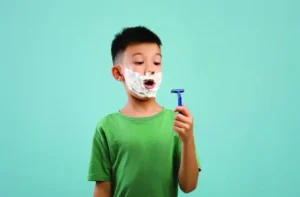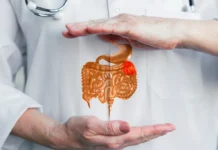Recently, there has been a growing concern about the early puberty of American girls, and several theories have tried to explain the reasons for this trend. Another possible factor to look at is the presence of chemicals in everyday products.
For example, phthalate esters found in vinyl products, medical devices, toys, and personal care products are being studied for their possible link to early puberty. According to Dr. LuAnn Moraski, an expert in paediatrics and internal medicine, no link has been established in the United States between cosmetics, meat, or other factors and early puberty.
What is Precocious Puberty?
Precocious puberty is the early initiation of sexual development in children, which can result in a variety of social, emotional, and physical difficulties. This difficult topic frequently unsettles parents and caregivers, who must manage its repercussions.
The goal of this page is to provide a thorough explanation of precocious puberty. It entails identifying symptoms, causes, and viable treatment alternatives. Parents can recognize early indicators of this ailment and undertake appropriate medical action for their children if they get a better grasp of it.
Understanding Precocious Puberty:
 Puberty is an important stage in a child’s life. It represents the transition from childhood to adolescence and, eventually, adulthood. During this time, young people go through tremendous physical and emotional changes as they mature into young men and women. Puberty usually begins in early adolescence.
Puberty is an important stage in a child’s life. It represents the transition from childhood to adolescence and, eventually, adulthood. During this time, young people go through tremendous physical and emotional changes as they mature into young men and women. Puberty usually begins in early adolescence.
In contrast to usual development, precocious puberty refers to the early appearance of indications of puberty before the expected age.
Detecting early signs of puberty is crucial, as it can sometimes be an indicator of an underlying health issue.
Symptoms of Precocious Puberty
Recognizing the signs of precocious puberty is crucial to seeking a timely medical evaluation. The symptoms may include:
- Girls: Early breast development and the onset of the first menstrual period.
- Boys: Enlargement of the testicles and penis; growth of facial hair; and a deeper voice.
- Pubic or underarm hair growth.
- Rapid overall growth
- Acne.
- Adult body odor.
In girls, signs of precocious puberty may include:
- Breast development before age 7 or 8.
- Menstruation (first period) before age 10.
- Rapid height growth (a growth spurt) before age 7 or 8.
In boys, signs of precocious puberty before 9 years of age may include:
- Enlargement of the testicles or penis.
- Rapid height growth (a growth spurt).
In both girls and boys, certain signs could be indicative of early puberty, but they might also be a normal part of development, such as:
- Development of pubic, underarm, or facial hair.
- Voice deepening.
- Acne.
- “Mature” body odor.
Causes of Precocious Puberty
The exact cause of precocious puberty is often challenging to identify. In some cases, certain conditions may be responsible, such as infections, hormone imbalances, brain issues, tumors, or injuries. There are two primary types of precocious puberty:
- Central Precocious Puberty: In this type, puberty begins earlier than usual but follows a typical developmental pattern. Often, the cause remains unknown, though rare cases can be linked to brain tumors, brain changes present from birth, radiation or injuries to the brain or spinal cord, or certain genetic conditions.
- Peripheral Precocious Puberty: This type occurs due to the premature release of estrogen or testosterone, bypassing the usual hormonal trigger (GnRH) from the brain. Potential causes include tumors in the adrenal glands or pituitary gland, exposure to creams or ointments containing sex hormones, and certain ovarian or testicular conditions.
Impact of Precocious Puberty on Kids:
 One of the significant concerns with precocious puberty is its potential effect on a child’s growth. Since puberty leads to the closure of growth plates in the bones, children with untreated precocious puberty might not reach their full adult height potential. Despite initially being taller than their peers due to an early growth spurt, they may stop growing prematurely and end up shorter than expected.
One of the significant concerns with precocious puberty is its potential effect on a child’s growth. Since puberty leads to the closure of growth plates in the bones, children with untreated precocious puberty might not reach their full adult height potential. Despite initially being taller than their peers due to an early growth spurt, they may stop growing prematurely and end up shorter than expected.
Emotionally and socially, going through puberty ahead of their peers can be challenging for children. For instance, girls with precocious puberty may feel confused or embarrassed about developing breasts and menstruating earlier than others. Additionally, they may be treated differently or even teased for looking older than their peers.
Moreover, precocious puberty can bring about emotional and behavioral changes in kids. Girls might experience mood swings and irritability, while boys could become more aggressive and develop an inappropriate sexual drive for their age.
Risk Factors of Precocious Puberty
 Certain factors may increase the likelihood of precocious puberty, including being female (girls are more susceptible) and being overweight or obese.
Certain factors may increase the likelihood of precocious puberty, including being female (girls are more susceptible) and being overweight or obese.
Normally, the onset of puberty is triggered by the hypothalamus, which signals the pituitary gland to release hormones that stimulate the ovaries in girls or testicles in boys to produce sex hormones. In many cases, precocious puberty, especially in girls, occurs due to the brain sending signals prematurely without an underlying medical problem.
However, in some instances, precocious puberty can be a result of more serious issues like tumors, trauma, thyroid problems, or ovarian problems, which would be accompanied by other symptoms indicating a significant problem. While less common in boys, about 5% of cases are inherited.
Not all cases of early sexual maturation are true precocious puberty. Some very young girls (typically between 6 months and 3 years old) might experience breast development that later disappears, known as premature thelarche, which usually resolves without lasting problems.
Similarly, some children may have early growth of pubic and/or underarm hair or body odor, unrelated to other sexual development changes, termed premature adrenarche. In such cases, seeing a doctor can help rule out true precocious puberty, but often no treatment is needed, and they will experience normal puberty at the expected age.
Complications and Management
Children experiencing precocious puberty may face some challenges, including shorter height due to premature bone maturation and potential social and emotional difficulties resulting from early physical changes. Addressing these concerns promptly can minimize the impact on a child’s well-being.
Prevention Strategies
While some risk factors are beyond control, parents can take measures to reduce the likelihood of precocious puberty.
- Ensure children do not have access to estrogen- or testosterone-containing substances, including adult prescription medications and diet supplements.
- Encourage children to maintain a healthy weight through balanced nutrition and regular physical activity.
Defining Normal Puberty Range
 Puberty is a natural process that marks the transition to sexual maturity and is accompanied by a surge of hormones that leads to various physical and emotional changes in adolescents. Girls experience breast development, growth of pubic and underarm hair, widening of hips and thighs, and menstruation. Boys, on the other hand, undergo enlargement of the testes, scrotum, and penis, along with the growth of pubic, underarm, and facial hair, and their voices change.
Puberty is a natural process that marks the transition to sexual maturity and is accompanied by a surge of hormones that leads to various physical and emotional changes in adolescents. Girls experience breast development, growth of pubic and underarm hair, widening of hips and thighs, and menstruation. Boys, on the other hand, undergo enlargement of the testes, scrotum, and penis, along with the growth of pubic, underarm, and facial hair, and their voices change.
It’s important to understand that the age at which puberty begins can vary widely. Dr. Moraski explains that puberty in girls can start anywhere between the ages of 7 and 16. Factors such as family patterns and behaviors can influence this timing. For example, girls who are athletes may experience delayed puberty, with the average age of menstruation being around 15 for competitive gymnasts.
Is Early Puberty Always a Concern?
 It is crucial to differentiate between “normal” early puberty and cases requiring medical attention. Dr Moraski clarifies that if a family has a history of early puberty, then a child following the same pattern would be considered normal, even if it appears early to others. On the other hand, a child with early breast development but no family history of early puberty should be evaluated by a physician to rule out potential underlying issues.
It is crucial to differentiate between “normal” early puberty and cases requiring medical attention. Dr Moraski clarifies that if a family has a history of early puberty, then a child following the same pattern would be considered normal, even if it appears early to others. On the other hand, a child with early breast development but no family history of early puberty should be evaluated by a physician to rule out potential underlying issues.
Some of the uncommon causes of early puberty in girls can include an underactive thyroid (hypothyroidism), brain problems like tumors, ovarian tumors, certain inherited syndromes, or exposure to additional sources of estrogen.
Factors Influencing Early Puberty
The American Academy of Pediatrics (AAP) highlights that obesity is a contributing factor to early puberty. Additionally, race can play a role, as girls tend to experience puberty a few months to a year earlier than girls of other races.
When to Seek Medical Attention
If a child displays any symptoms of precocious puberty, it is essential to schedule an appointment with their healthcare provider promptly. Early detection can lead to a better understanding of the underlying cause and appropriate treatment.
Diagnosis of Precocious Puberty:
 If you observe signs of early sexual maturation in your child, such as breast development, rapid height growth, menstruation, acne, enlarged testicles, or pubic or underarm hair, it is essential to consult your doctor. The doctor may conduct blood tests to check for high levels of sex hormones and might use X-rays of the wrist and hand to assess bone maturation.
If you observe signs of early sexual maturation in your child, such as breast development, rapid height growth, menstruation, acne, enlarged testicles, or pubic or underarm hair, it is essential to consult your doctor. The doctor may conduct blood tests to check for high levels of sex hormones and might use X-rays of the wrist and hand to assess bone maturation.
In rare instances, imaging tests like MRIs and ultrasound studies could be done to rule out uncommon causes like tumors in the brain, ovaries, or testicles.
Treating Precocious Puberty:
If your child is diagnosed with precocious puberty, the doctor may refer you to a pediatric endocrinologist, who specializes in growth and hormonal disorders in children, for appropriate treatment.
Treatment goals for precocious puberty involve:
- Halting or even reversing sexual development.
- Stopping rapid growth and bone maturation, which could lead to adult short stature or the early onset of periods.
Treatment methods depend on the underlying cause.
- Treating the underlying cause or disease.
- Lowering high levels of sex hormones with medication will stop sexual development.
Most cases involve hormone therapy using LHRH analogs. These synthetic hormones block the body’s production of the sex hormones responsible for early puberty. Positive results are typically seen within a year of starting treatment. LHRH analogs are generally safe and cause minimal side effects in children.
In girls, breast size might decrease, and in boys, the size of the penis and testicles might return to what is expected for their age. Growth in height will slow down to a rate typical for prepubescent kids, and behavior usually becomes more age-appropriate.
Parental Guidance and Support

Parents and caregivers may be concerned about their child’s early development for various reasons, including potential risks of predation or abuse and emotional unpreparedness. While hormone-suppressing drugs are available to delay puberty onset, Dr. Moraski advises approaching the situation with compassion and common sense.
Her recommendations for parents and caregivers of puberty-aged children are as follows:
- Initiate early discussions with kids about their changing bodies, offering love, support, and openness to answer any questions.
- If you are concerned about early development, consult a doctor for a complete checkup. In many cases, fears can be eased without additional testing.
- In the case of early puberty due to an underlying disorder, early recognition and support can minimize both physical and emotional effects.
Dr. Moraski emphasizes that starting conversations about puberty within the family well before its expected onset can be beneficial. By laying the groundwork early on, the potential fear and shame associated with early changes can be reduced.
Should a parent feel that their daughter is experiencing puberty too early, Dr. Moraski suggests discussing concerns with a doctor as soon as possible and considering a specialist’s opinion if necessary.
How Parents Can Help:
It’s essential for parents to provide a simple and honest explanation to their children about what is happening. Let them know that these changes are a normal part of growing up, but in their case, their body started developing a little earlier than usual. Keep your child informed about the treatment process and what to expect along the way.
Additionally, parents should be alert to signs of emotional distress or problems that may be affecting their child.
- Poor grades.
- School-related issues.
- Loss of interest in daily activities.
- Signs of depression.
Parents can significantly impact how well their children cope with precocious puberty.
- Refrain from making comments about the child’s appearance.
- Offer praise for achievements in academics or sports.
- Support the child’s interests.
It is essential to remember that doctors can effectively treat precocious puberty. They can help children achieve their full adult height potential and mitigate the emotional and social stress that early maturation may bring about.
Conclusion
Both parents and healthcare providers must pay attention to and comprehend precocious puberty. Recognizing symptoms, understanding causes, and obtaining an immediate medical assessment can help children control their early development efficiently. We can support children through their physical and mental issues by raising awareness and intervening early, guaranteeing a healthy and rewarding life for them.
To better understand early puberty, a balanced approach is required. This entails taking into account both cultural influences and potential health issues. Parents may help their children navigate this changing stage of life with confidence and general well-being by encouraging open communication, getting medical advice, and offering emotional support.














